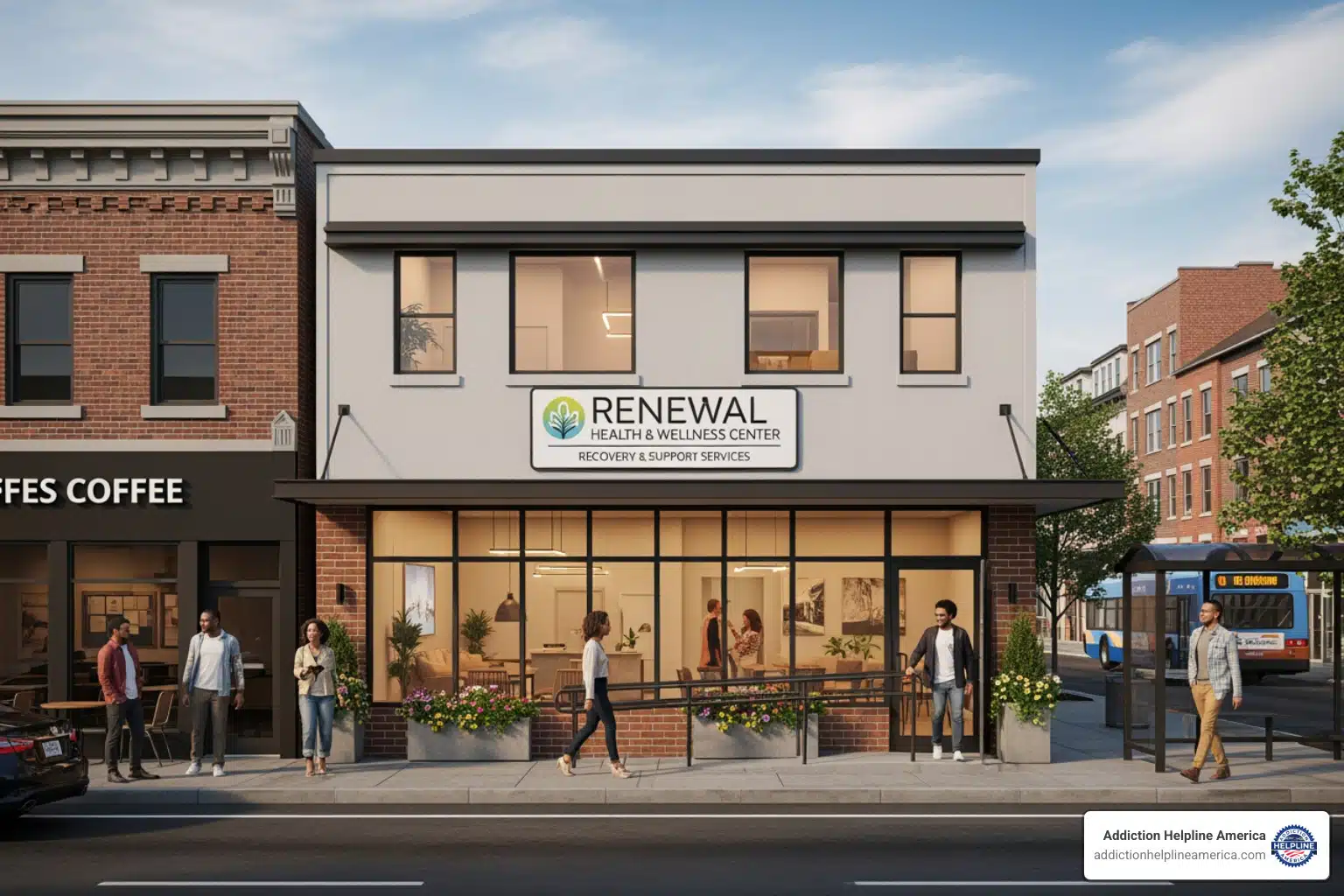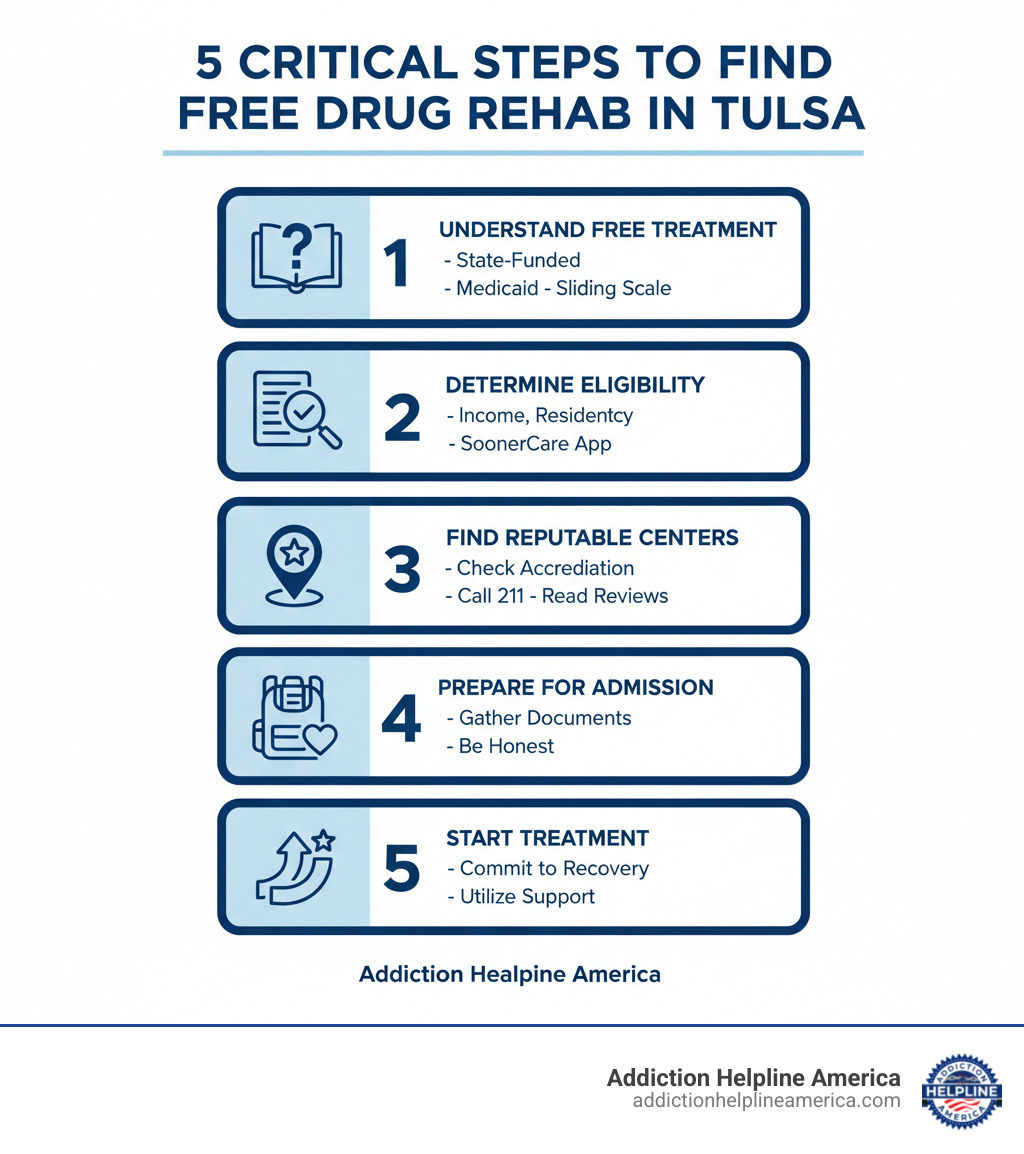
Why Finding Free Drug Rehab in Tulsa Matters
Free drug rehab centers in Tulsa, Oklahoma provide hope for individuals and families who need addiction treatment but cannot afford it. If you’re searching now, here’s what you need to know:
Quick Answer: Free and Low-Cost Rehab Options in Tulsa
- State-Funded Programs: Oklahoma operates publicly funded programs through the Department of Mental Health and Substance Abuse Services (ODMHSAS)
- Medicaid (SoonerCare): Many Tulsa facilities accept Oklahoma’s Medicaid program for comprehensive treatment coverage
- Sliding-Scale Fees: Centers like Human Skills & Resources explicitly state no one is refused due to inability to pay
- Non-Profit Programs: Organizations like Family & Children’s Services provide treatment regardless of income
- Faith-Based Options: Programs like H.O.W. Foundation offer free residential recovery for men
Cost should never be a barrier to recovery. Oklahoma is home to dozens of free drug rehabilitation centers offering detox programs, mental health treatment, support groups, outpatient and inpatient rehab programs, individualized treatment plans, and aftercare options. While waitlists can be long and holistic treatments may be limited, the care you receive will be evidence-based and designed to support lasting recovery.
The average cost of addiction treatment in Tulsa is $52,085, but many residents qualify for free or significantly reduced-cost services through government funding, Medicaid, or payment assistance programs. Some treatment centers only require you to apply for a spot and wait for availability, while others may require you to obtain government funding first.
At Addiction Helpline America, we’ve spent years connecting individuals and families in Tulsa to free drug rehab centers in Tulsa, Oklahoma that provide compassionate, effective care regardless of financial circumstances. We understand the urgency you’re feeling and can guide you through every step of accessing treatment today.
Free drug rehab centers in tulsa oklahoma further reading:
Step 1: Understand What “Free” and Low-Cost Treatment Entails
When you’re searching for free drug rehab centers in Tulsa, Oklahoma, it’s important to understand what “free” really means in this context. It rarely means completely free from all costs under every circumstance, but rather that treatment is accessible without creating a significant financial burden. These programs exist because of state funding, non-profit organizations, and charitable donations that make recovery possible for everyone, regardless of their ability to pay.
State-funded programs operate through the Oklahoma Department of Mental Health and Substance Abuse Services (ODMHSAS). These facilities receive government funding specifically designed to help people with substance abuse and mental health disorders, ensuring that residents of Oklahoma can access care when they need it most. Non-profit organizations like Family & Children’s Services are dedicated to providing behavioral health and substance use programs regardless of an individual’s income. Similarly, the H.O.W. Foundation offers no-cost residential recovery programs for men, relying on community support and donations to keep their doors open.
Sliding-scale fees are another common approach you’ll encounter. Centers like Human Skills & Resources explicitly state that no one is refused services due to inability to pay. Instead, they adjust costs based on your financial situation. Payment assistance programs and scholarships may also be available, further reducing the financial barrier to entry.
The benefits of choosing a free or low-cost rehab center in Tulsa are significant. Affordability is the most obvious—treatment is either completely free or comes at a very low cost, removing a major hurdle for many seeking help. These facilities typically offer evidence-based practices, ensuring you receive effective care that’s been proven to work. You’ll find a diverse community of individuals from various backgrounds, which often fosters a supportive, understanding environment. Free addiction recovery and detox centers also provide robust support systems, including a range of evidence-based treatment programs and services designed to address your unique needs.
However, it’s also important to be aware of potential limitations. Waitlists can be long due to high demand and limited funding. Limited capacity means these programs might not offer the same breadth of specialized treatments or the speed of admission that private facilities can. While effective, these programs might not offer the same range of holistic treatments (like yoga, art therapy, or equine therapy) that private pay facilities might include in their offerings.
Despite these limitations, the primary goal of free drug rehab centers in Tulsa, Oklahoma remains clear: ensuring that anyone in need of addiction treatment can receive it, regardless of their financial status. Recovery shouldn’t be a privilege reserved for those who can afford it—it’s a fundamental right, and these programs exist to make that a reality.
Types of Services Available
Free rehab facilities in Oklahoma typically offer a comprehensive range of services to address various aspects of addiction and recovery. Understanding what’s available can help you know what to expect when you begin your journey.
Detoxification is often the first step, providing a safe, supervised environment for individuals to physically withdraw from substances. Medically-supervised withdrawal ensures comfort and safety during this critical phase, with trained professionals monitoring your progress around the clock.
Inpatient residential programs involve living at the facility for a period, offering 24/7 care, a structured environment, and intensive therapy. For example, Tulsa Boys Home offers 60-90-120 day residential long-term inpatient drug rehab, providing extended support for those who need it.
Outpatient programs come in different intensities. Partial Hospitalization Programs (PHP) provide intensive treatment during the day, allowing patients to return home at night. Intensive Outpatient Programs (IOP) offer a less intensive schedule than PHP, allowing individuals to maintain work or family responsibilities while receiving treatment. Action Steps Counseling Inc offers an IOP for those who need flexibility.
Medication-Assisted Treatment (MAT) combines FDA-approved medications (like buprenorphine, methadone, Suboxone, and Vivitrol) with counseling and behavioral therapies. This is an evidence-based approach particularly effective for opioid and alcohol use disorders.
Dual diagnosis care recognizes that co-occurring mental health disorders (like anxiety, depression, or PTSD) are common among those struggling with addiction. Many free centers provide mental health treatment alongside substance abuse treatment, addressing both issues simultaneously.
Counseling and therapy form the backbone of most recovery programs. This includes individual counseling, group therapy, and family counseling. Therapeutic modalities often include Cognitive Behavioral Therapy (CBT) and Motivational Interviewing (MI), both proven effective in treating addiction.
Support groups are frequently integrated into treatment or offered as referrals. Facilities often connect clients with Alcoholics Anonymous (AA) and Narcotics Anonymous (NA), providing ongoing peer support that extends beyond formal treatment.
Aftercare options are essential for long-term recovery. These include continued counseling, relapse prevention planning, and connections to sober living communities that provide structure and support as you transition back to independent living.
Free vs. Private Pay Rehab in Tulsa
When considering your options for addiction treatment in Tulsa, it helps to understand the differences between free and private pay rehab centers. Both aim for the same goal—your recovery—but they approach it with varying resources and structures.
| Feature | Free Drug Rehab Centers in Tulsa | Private Pay Rehab Centers in Tulsa |
|---|---|---|
| Cost | Free or low-cost, minimal or no cost to the client. Covered by government grants, Medicaid, or non-profit organizations. | Typically expensive, ranging from tens of thousands of dollars for short-term to over $100,000 for luxury or long-term programs. Often covered by private insurance. |
| Amenities | Basic, functional, and clean facilities. Focus on core treatment. | Can include luxury accommodations, private rooms, gourmet meals, spa services, fitness centers, and various recreational activities. |
| Wait Times | Possible waitlists due to high demand and limited funding. Varies by facility and program type. | Generally immediate or very short wait times due to lower demand and higher capacity. |
| Staff-to-Patient Ratio | May have higher patient-to-staff ratios due to funding constraints. | Often lower patient-to-staff ratios, allowing for more individualized attention. |
| Treatment Approaches | Evidence-Based Practices (CBT, MI), Support Groups, Individualized Plans. | Evidence-Based Practices, Holistic Therapies (e.g., yoga, meditation, art therapy), Experiential Therapies, Customized Programs. |
| Holistic Options | Limited availability of holistic treatments due to resource constraints. | Wide range of holistic and alternative therapies often included in treatment plans. |
The reality is that both types of facilities can provide effective treatment. Free programs focus on delivering evidence-based care that works, even if the surroundings are more basic. Private facilities may offer more comfort and amenities, but the core therapeutic approaches often overlap. What matters most is your commitment to recovery and finding a program that meets your specific needs—and free drug rehab centers in Tulsa, Oklahoma can absolutely provide that foundation for lasting change.
Our helpline is 100%
free & confidential
If you or someone you care about is struggling with drug or alcohol addiction, we can help you explore your recovery options. Don’t face this challenge alone—seek support from us.
Programs
Resources
Will my insurance
cover addiction
treatment?
We're ready to help
Find the best
drug or alcohol treatment
center
Are you or a loved one struggling with addiction? Call today to speak to a treatment expert.














